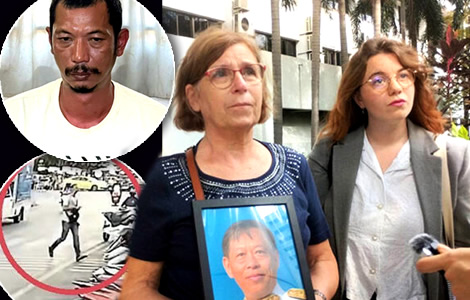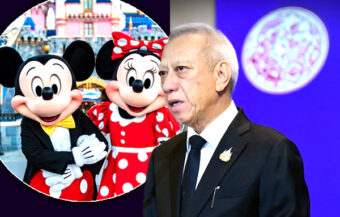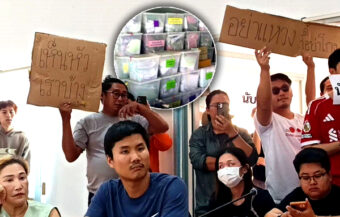Hitman who murdered Cambodian opposition leader Lim Kimya in Bangkok is sentenced to life in prison, while his Cambodian handlers remain free, shielded by Hun Sen’s regime, leaving questions over justice and safety for exiled dissidents unresolved.
The family of assassinated Cambodian opposition leader Lim Kimya sat in a Bangkok court on Friday as his killer, Ekkalak Paenoy, received a life sentence. Ekkalak had confessed, but he was no lone gunman. He was a hired hitman, paid by a Cambodian handler to silence the former MP. Lim Kimya was gunned down the instant he stepped off a tourist bus from Cambodia on January 6th. On that same bus rode Pich Kimsrin, whose family is linked to Phnom Penh’s ruling elite. Ekkalak carried out the murder under orders from a handler, another Cambodian. Both suspects fled Thailand. They are now untouchable, shielded by Hun Sen’s Cambodia.

A Thai court on Friday sentenced former naval serviceman Ekkalak Paenoi to life imprisonment for murdering Cambodian opposition figure Lim Kimya. Initially, the court had imposed the death penalty, but it was reduced after Ekkalak confessed to his involvement. Furthermore, the court ordered him to pay ฿1.79 million in compensation to Lim’s widow, Anne-Marie Lim. The amount, roughly $52,000, reflects acknowledgement of the family’s suffering, though it cannot replace their loss.
Lim Kimya, 74, was a former member of Cambodia’s opposition Cambodia National Rescue Party. He was shot in broad daylight near Khao San Road in Phra Nakhon, one of Bangkok’s busiest tourist districts.
Notably, the attack occurred hours after he arrived in Thailand from Cambodia with his wife and brother. Witnesses described the gunman approaching Lim’s vehicle with calculated precision, confirming premeditation. Immediately, police cordoned off the area and began gathering evidence.
Thai authorities detail Ekkalak Paenoi’s escape and extradition after the assassination in Bangkok
According to Thai authorities, Ekkalak fled to Cambodia late on the night of January 7. He crossed the Khao Din Permanent Border Crossing in Sa Kaeo province. Cambodian authorities detained him in Battambang before transferring him to Phnom Penh. Subsequently, he was extradited back to Thailand on January 11 to face trial. During the investigation, Thai police worked closely with Cambodian law enforcement to secure his capture.
Ekkalak, 41, had served as a technician in the Royal Thai Navy. Widely known as “Sergeant M,” he used his military training to carry out the killing with chilling efficiency. During trial proceedings, prosecutors charged him with premeditated murder, carrying a weapon, and discharging a firearm in public. His confession ultimately reduced the death sentence to life imprisonment.
Additionally, the trial included a second defendant, taxi driver Chakit (or Chamnan) Buaplee. Prosecutors accused him of aiding Ekkalak’s escape for ฿4,500. However, the court dismissed the charges, citing insufficient evidence that he knew about the crime. Consequently, Buaplee was acquitted, highlighting the court’s focus on intent and direct involvement.
Two Cambodian nationals remain wanted with ties to the ruling elite complicating extradition attempts
Two Cambodian nationals, Ly Ratanaksmey and Pich Kimsrin, remain wanted in connection with the assassination. In particular, Pich Kimsrin was reportedly on the same bus that brought Lim Kimya to Bangkok. Lim’s family and human rights activists have repeatedly urged authorities to extradite the two men. They argue that full accountability is necessary to prevent future attacks on political exiles.
Lim Kimya was a joint Cambodian and French citizen. Moreover, he had long opposed Cambodia’s government and advocated for democracy. He was a prominent figure in the Cambodia National Rescue Party, which a Cambodian court dissolved in 2018. The party was accused of plotting treason, allegations it denied as fabricated. Despite the party’s dissolution, Lim continued his advocacy abroad, often highlighting human rights violations in Cambodia.
The killing shocked both Thailand and Cambodia. Many observers criticised the brazen nature of the attack in a central tourist district. In addition, it raised questions about the safety of exiled politicians in Southeast Asia.
Officials deny political motives while critics highlight Cambodian regime’s suppression of opposition
Human rights groups described the attack as a warning to other opposition figures living abroad. Consequently, the case drew intense scrutiny from international observers and local media alike.
National Police Commissioner General Kittirat Phanphet insisted the killing was not politically motivated. He claimed Ekkalak acted out of a personal grudge. Nevertheless, critics remain sceptical. They highlight that Cambodia’s regime has systematically suppressed opposition, leaving Prime Minister Hun Sen and his family in power for over four decades. Moreover, the involvement of Cambodian nationals in the killing reinforces suspicions of political influence.
Ekkalak’s motives remain only partially clear. While he confessed, he refused to name who ordered the hit. He claimed he acted out of gratitude toward a benefactor who supported him.
Meanwhile, investigators suspect a third Cambodian figure provided intelligence for the attack. The lack of clarity has frustrated Lim’s family and human rights advocates. They continue pressing for full transparency in the investigation.
Assassination highlights legal and political challenges with an urgent need for regional cooperation
The assassination highlights significant legal and political challenges. Thai authorities successfully prosecuted a foreign national for a crime committed in Thailand. However, efforts to locate and extradite the other two suspects have been slow.
Experts argue that stronger regional cooperation between Cambodia and Thailand is essential. Without it, political assassinations of exiles could continue to occur with impunity. Of course, this is never likely to happen. Especially now, with the estranged relationship between the two countries.
During trial proceedings, Anne-Marie Lim testified about her husband’s final moments. She described arriving at the Bangkok bus terminal. She was to accompany Lim to his hotel. Soon afterwards, the shooting occurred in broad daylight.
Witnesses also reported seeing Ekkalak approach the vehicle calmly, reflecting careful planning. Consequently, the court emphasised the premeditated nature of the crime in its ruling.
Lim Kimya’s assassination brings home extreme risks faced by political exiles targeted by trained operatives
The case brings home the dangers faced by political exiles in Southeast Asia. Analysts note that many Cambodian opposition figures abroad experience harassment, surveillance, and threats to their lives. Consequently, Lim Kimya’s assassination is part of a larger pattern of transnational political intimidation. Human rights advocates argue that failure to protect such individuals undermines democracy and political pluralism.
Ekkalak’s background adds another layer of complexity. His military training likely facilitated the precise execution of the assassination. Moreover, his knowledge of firearms and operational tactics highlights the danger posed by professional operatives. Consequently, observers warn that political assassinations in the region may be executed with increasing sophistication.
The court’s verdict represents a partial victory for Lim’s family. Nevertheless, the failure to apprehend all suspects has drawn criticism. Human rights organisations argue that impunity emboldens those who orchestrate attacks on dissidents. They continue to call for stronger international cooperation and diplomatic pressure to ensure justice.
Thailand’s legal system shows successes in prosecution but exposes limits in cross-border enforcement
Thailand’s legal system demonstrated both strengths and limitations. On the one hand, it successfully prosecuted a Thai national and secured his extradition from Cambodia. On the other hand, transnational coordination to capture remaining suspects has lagged. Legal experts stress that improved extradition mechanisms could prevent similar crimes in the future.
Lim Kimya’s legacy remains significant. He spent decades advocating for democracy and human rights in Cambodia. His work inspired opposition movements and highlighted government abuses.
Consequently, his death is a stark reminder of the threats faced by political dissidents in the region.
The case demonstrates gaps in protection for exiles despite professional law enforcement measures
Authorities are reportedly reviewing security protocols for visiting or residing political exiles in Thailand. Measures aim to prevent attacks in busy public spaces. Such reviews reflect concern over the vulnerability of foreign political figures.
Lim Kimya’s murder also raises broader questions about transnational enforcement and collaboration between Thailand and Cambodia. Analysts warn that insufficient coordination could allow political killings abroad to continue with impunity.
The verdict provides a measure of justice but highlights ongoing challenges to protecting dissidents and enforcing international law.
Lingering questions remain over the mastermind’s identity and Cambodia’s potential involvement in murder
Despite the court ruling, the identity of the mastermind behind the assassination has not been revealed. Investigators continue probing potential Cambodian involvement. Diplomatic channels between Thailand and Cambodia are presently nearly severed becasue of this Summer’s border war. It should play a critical role in resolving remaining legal issues, including extradition requests and broader transnational investigations. Nonetheless, this is no longer a normal functioning state.
It is indeed a rogue state governed by a family dynasty whose GDP is increasingly derived from international scam compounds.
International observers have condemned the killing. They argue that stronger protections are needed for political exiles. The case has highlighted gaps in security, law enforcement and international cooperation. Analysts warn that political violence abroad undermines regional stability and democratic principles.
Lim Kimya’s family continues to seek justice. They emphasise that only the full prosecution of all suspects will deliver accountability. Human rights organisations echo this demand, stressing that impunity sends the wrong message. Without consequences, opposition figures abroad remain vulnerable.
The Thai court’s verdict closes one chapter in the story. However, the pursuit of justice continues until Ly Ratanaksmey and Pich Kimsrin are apprehended. Until then, questions about political influence, cross-border violence, and the safety of dissidents remain unresolved.
Lim Kimya’s life and work endure as symbols of resilience and advocacy for democracy and human rights
Lim Kimya’s life and work endure as symbols of resilience. His advocacy for democracy, human rights, and political freedoms has left a lasting impact. Moreover, his assassination serves as a cautionary tale about the dangers faced by opposition figures. It also highlights the urgent need for stronger protections and international collaboration to prevent politically motivated killings.
Murder of ex-Cambodian MP Kim Limfa linked to regime through second wanted suspect Kimsrin Pich
Police chief insists murder of former Cambodian MP Kim Limya was a personal grudge and not political
Ekkalak Paenoi’s conviction marks progress, but the story is not complete. Until all responsible parties face justice, Lim Kimya’s assassination will remain a powerful symbol of the risks facing political exiles.
Meanwhile, the international community continues to call for a comprehensive investigation, extradition, and prevention measures.
The case will likely continue to shape legal and human rights discussions concerning both Thailand and Cambodia. Observers note that it underlines the consequences of weak transnational enforcement and the continuing threats to political dissidents. Furthermore, it highlights the ongoing struggle for accountability in politically sensitive crimes across Southeast Asia.
Join the Thai News forum, follow Thai Examiner on Facebook here
Receive all our stories as they come out on Telegram here
Follow Thai Examiner here
Further reading:
Police chief insists murder of former Cambodian MP Kim Limya was a personal grudge and not political
Murder of ex-Cambodian MP Kim Limfa linked to regime through second wanted suspect Kimsrin Pich
Hitman who gunned down former Cambodia MP in Bangkok arrested in Cambodia. Taken to Phnom Penh
Former Cambodian French opposition MP and thorn in the side of ruling party gunned down in Bangkok
Increased US naval presence and operations as China expands its footprint
Thai woman’s claims that she was targeted for organ harvesting being probed in Cambodia by police
Cambodia’s recall of diplomatic passports linked to press reports of Yingluck’s Hong Kong dealings
Cambodian opposition will be denied entry into Thailand as it seeks to topple Hun Sen


















